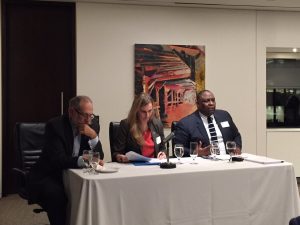I published this 2016 Year in Review – Personal Reflections on LinkedIn:
As I reflected on the year just passed, I have been considering the media commentary that I gave on a range of trade, competition, investment, sanctions and innovation issues. I thought that the start of a new year would be a good opportunity to review and update a few areas that I expect to be thinking about and working on in 2017.
At the close of 2015, I chaired a first of its kind Canadian Sharing Economy Symposium in Toronto and 2016 started off with my participating in an insightful Canadian Competition Bureau Workshop on Disruptive Competition. In 2017, one area where I expect these issues to come into sharper focus is the role of Fintech as a disruptor or enabler for Canada’s big banks.
Trade law is another area where the theme of disruption seemed to dominate the landscape in 2016. This was exemplified by the stunning Brexit vote in the UK, the tumultuous conclusion of the CETA negotiations, the apparent stalling of the TPP and the threats from candidate, now President-Elect, Donald Trump to renegotiate or terminate NAFTA. 2017 will probably not offer much clarity on any of these fronts. The UK will likely trigger Article 50 to commence Brexit negotiations with the European Union, the final ratification and implementation on CETA will depend on the outcome of cases before the European Court of Justice, TPP may be frozen in suspended animation until a propitious time arrives for a rebranding if not a renegotiation, and Canada and Mexico wait to see what exactly President Trump wants to do with NAFTA. One likely target may be renewed “Buy American” programs in connection with his ambitious infrastructure spending proposals and another may involve addressing recurring U.S. concerns about competitive disadvantage from the Value Added Tax (VAT) in Mexico or the Goods and Services Tax (GST) in Canada.
This trade negotiation uncertainty is set against the backdrop of renewed bilateral trade disputes relating to Softwood Lumber and potential WTO trade disputes involving Canadian government support to Bombardier’s civil aircraft production. However, despite the continuing debates around the merits of investor-state dispute settlement in trade agreements, one pending NAFTA Chapter 11 challenge by TransCanada relating to the approval of the Keystone XL pipeline project will likely be resolved with the election of President Trump and the near certain approval of the project.
Just as infrastructure is emerging as a potential flash point in trade, it is also on the agenda of competition enforcement. More often than not, concerns arise around bid-rigging highlighting the need for pro-active compliance steps for government agencies and other organizations that source construction or other services through tender processes and trade and professional associations whose members provide procurement-related services. One area of enforcement activity for the Canadian Competition Bureau in 2016 was in the supply of condominium refurbishment services in the Greater Toronto Area and this can be expected to continue into 2017.
In 2016, international issues also continued to be noteworthy in competition law and policy and in the cross-border merger context in particular. In 2017 these issues can be expected to be in the spotlight in connection with the proposed notification and approval of the potential merger between the two leading Canadian potash producers, Potash Corp. of Saskatchewan Inc. and Agrium Inc. This is of particular interest given the divergent views of the Canadian and U.S. antitrust agencies on the claimed efficiencies in connection with the proposed acquisition of chemical producer Canexus Corporation by Superior Plus Corporation. While the Canadian Competition Bureau cleared the merger, in the United States, the Federal Trade Commission (FTC) announced that it would challenging the transaction and in the end the transaction was abandoned.
Economic sanctions were another area of great international enforcement cooperation and convergence in 2016 with the easing of U.S. and international sanctions on Iran and U.S. sanctions on Cuba. This policy disruption opened a world of trade and investment opportunities but 2017 is likely to give way to renewed uncertainty until President Trump clarifies his intentions.
Another area of policy disruption where international legal issues and competition issues will continue to intersect is the efforts to legalize the sale and distribution of marijuana in Canada. In 2017, the contours of the regulatory landscape that will define the conditions of competition for producers and retailers should come into sharper focus.
On a personal level, a high point of 2016 for me was being invited to serve as a panelist at the All-American Regional Round of the 14th annual European Law Students’ Association (ELSA) Moot Court Competition on WTO Law, participating in an International Trade Panel at the 2016 Asian Canadian Law Students Conference, and speaking on international sales agreements and business formation in a Kyiv Chamber of Commerce & Industry Workshop on Accessing the Canadian Market.
2016 was a fun and interesting year, and in 2017 I look forward continuing to work on cutting-edge issues of innovation, competition, investment and trade giving advice to businesses and trade associations on compliance, governance and transactions and to governments on legislative and regulatory design.
And so let me take this opportunity to offer all of you, my very best wishes for a productive and a prosperous new year!

 Mark Warner participated in a Canadian Friends of the London School of Economics and Political Science (
Mark Warner participated in a Canadian Friends of the London School of Economics and Political Science ( ion in 2004.
ion in 2004.